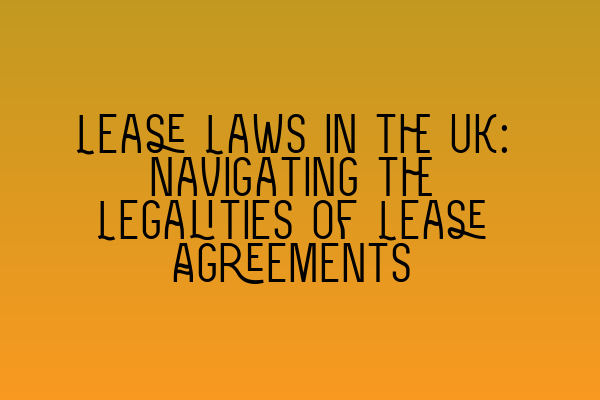Lease Laws in the UK: Navigating the Legalities of Lease Agreements
As a landlord or tenant in the UK, it is crucial to have a comprehensive understanding of lease laws. Lease agreements form the foundation of the landlord-tenant relationship and govern the rights and responsibilities of both parties. Navigating the legalities of lease agreements can be complex, requiring the expertise of a property law solicitor to ensure compliance with the law and protect your interests.
In this blog post, we will explore the key aspects of lease laws in the UK, shedding light on the legal framework that surrounds lease agreements. Whether you are a landlord or a tenant, understanding these legalities will empower you to make informed decisions and ensure a smooth leasing experience.
1. The Basics of Lease Agreements
A lease agreement is a legally binding contract between a landlord and a tenant that outlines the terms and conditions of the tenancy, including rent, duration, and other rights and obligations. It is essential to have a written lease agreement in place to avoid misunderstandings and protect both parties’ interests.
2. Types of Lease Agreements
Lease agreements can take various forms, with the most common being Assured Shorthold Tenancies (ASTs). ASTs offer tenants a minimum term of six months and provide them with certain legal protections. However, other types of lease agreements, such as Common Law Tenancies and Company Tenancies, exist, each with its own set of regulations that need to be understood.
3. Rent and Rent Increases
Rent is a fundamental aspect of lease agreements. It is important to understand how rent is determined, whether through market rates or fixed terms, to ensure clarity and fairness. Additionally, both landlords and tenants need to be aware of the legal procedures and notice periods surrounding rent increases to prevent disputes and maintain a harmonious landlord-tenant relationship.
4. Repair and Maintenance
The responsibility for repair and maintenance is an essential consideration in lease agreements. Certain repairs fall under the landlord’s obligation, while others may be the tenant’s responsibility. Understanding the distinction between repair obligations and the process for reporting and resolving issues is crucial to avoid disputes and ensure a habitable living or working environment.
5. Termination and Renewal
Lease agreements have a designated duration, but what happens when the agreed term expires? Both landlords and tenants must comprehend the procedures and notice periods required for terminating or renewing a lease. Failure to comply with the legal requirements can result in unintended consequences and potential legal disputes.
6. Deposit Protection
Under UK law, landlords are legally required to protect their tenants’ deposits in a government-approved tenancy deposit scheme. Failure to do so can result in severe penalties. Tenants should ensure their deposits are protected and be aware of their rights regarding the return of the deposit at the end of the tenancy.
7. Evictions and Disputes
While eviction is a last resort, landlords must understand the legal procedures to regain possession of their property. Similarly, tenants should be aware of their rights and the conditions under which a landlord can seek eviction. In the case of disputes, mediation or legal action may be necessary, and seeking legal advice can help protect your interests in such circumstances.
Conclusion
Lease laws in the UK are complex and often require professional expertise to navigate effectively. Whether you are a landlord drafting a lease agreement or a tenant reviewing one, understanding the legalities surrounding lease agreements is crucial to protect your rights and interests. Seeking the advice of a property law solicitor can provide you with the necessary guidance to ensure compliance with the law.
At SQE Property Law & Land Law, we offer expert legal services and guidance on lease laws in the UK. Our team of experienced solicitors can help you understand the intricacies of lease agreements, provide sound legal advice, and protect your interests throughout the tenancy. Contact us today to schedule a consultation and ensure a smooth leasing experience.
Related Articles:
– SQE 1 Practice Exam Questions
– SQE 1 Practice Mocks FLK1 FLK2
– SQE 2 Preparation Courses
– SQE 1 Preparation Courses
– SRA SQE Exam Dates
